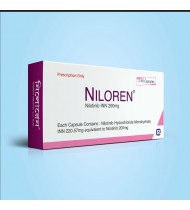Nilotinib
Indications
Treatment of newly diagnosed adult patients with Philadelphia chromosome positive chronic myeloid leukemia (Ph+ CML) in chronic phase. The study is ongoing and further data will be required to determine long-term outcome.
Treatment of chronic phase (CP) and accelerated phase (AP) Ph+ CML in adult patients resistant to or intolerant to prior therapy that included imatinib. Clinical benefit, such as improvement in disease-related symptoms or increased survival, has not been demonstrated.
Treatment of chronic phase (CP) and accelerated phase (AP) Ph+ CML in adult patients resistant to or intolerant to prior therapy that included imatinib. Clinical benefit, such as improvement in disease-related symptoms or increased survival, has not been demonstrated.
Pharmacology
Nilotinib is a potent inhibitor of BCR-ABL tyrosine kinase. It binds to and stabilises the inactive conformation of the kinase domain of Abl protein.
Dosage
Adult: 400 mg bid. May continue until patient shows unacceptable toxicity or evidence of progression.
Patient on strong CYP3A4 inhibitor: Reduce dose to 300 mg once daily, or to 200 mg once daily in newly-diagnosed chronic phase Philadelphia chronic myelogenous leukaemia. Dose may be adjusted to usual dose after a washout period.
Patient on drugs that prolong QT interval (e.g. antiarrhythmics): Reduce dose and closely monitor for QT interval prolongation.
Hepatic Impairment: Use a lower starting dose.
Patient on strong CYP3A4 inhibitor: Reduce dose to 300 mg once daily, or to 200 mg once daily in newly-diagnosed chronic phase Philadelphia chronic myelogenous leukaemia. Dose may be adjusted to usual dose after a washout period.
Patient on drugs that prolong QT interval (e.g. antiarrhythmics): Reduce dose and closely monitor for QT interval prolongation.
Hepatic Impairment: Use a lower starting dose.
Administration
Should be taken on an empty stomach. Avoid food at least 2 hr before & at least 1 hr after a dose. Swallow whole, do not chew/crush. Avoid grapefruit products.
Interaction
Drugs that inhibit gastric acid secretion (e.g. PPIs) may reduce solubility and bioavailability of nilotinib.
Contraindications
Patient with hypokalaemia, hypomagnesaemia or long QT syndrome. Concomitant use with potent CYP3A4 inhibitors or antiarrhythmics and other QT prolonging drugs. Concomitant use with potent CYP3A4 inducers.
Side Effects
Rash, pruritus, hepatotoxicity, headache, fever, fatigue, GI disturbances (nausea, constipation, diarrhoea), alopecia, asthenia, muscle spasms, arthralgia, myalgia, pain (e.g. musculoskeletal or chest pain), oedema, folliculitis, papilloma, insomnia, dizziness, vertigo, anxiety, paraesthesia, hyperhidrosis, dry skin, urticaria, acne, conjunctivitis, dry eye, flushing, dyspnoea, cough, myelosuppression (e.g. thrombocytopenia, neutropenia, and anaemia), thrombotic disorders or haemorrhage, arrhythmias, heart failure, pericarditis, palpitations, HTN, angina, MI; elevated AST/ALT, serum lipase; electrolyte imbalances.
Pregnancy & Lactation
Category D: There is positive evidence of human foetal risk, but the benefits from use in pregnant women may be acceptable despite the risk (e.g., if the drug is needed in a life-threatening situation or for a serious disease for which safer drugs cannot be used or are ineffective).
Precautions & Warnings
Patient with history of pancreatitis, with total gastrectomy. Hepatic impairment. Maintain adequate hydration and correct uric acid levels, hypomagnesaemia, hypokalaemia and other electrolyte imbalances prior to therapy. Pregnancy and lactation.
Overdose Effects
Symptoms: Neutropenia, vomiting and drowsiness.
Management: Monitor patient and give supportive treatment.
Management: Monitor patient and give supportive treatment.
Therapeutic Class
Targeted Cancer Therapy
Storage Conditions
Store below 30° C.
Niloren Capsule 200 mg
IndicationsTreatment of newly diagnosed adult patients with Philadelphia chromosome positive chronic..
800.00Tk.
Tasigna Capsule 200 mg
IndicationsTreatment of newly diagnosed adult patients with Philadelphia chromosome positive chronic..
3,051.50Tk.
Showing 1 to 2 of 2 (1 Pages)


%20Limited/Tasigna%20Capsule%20200%20mg-190x210.jpg)